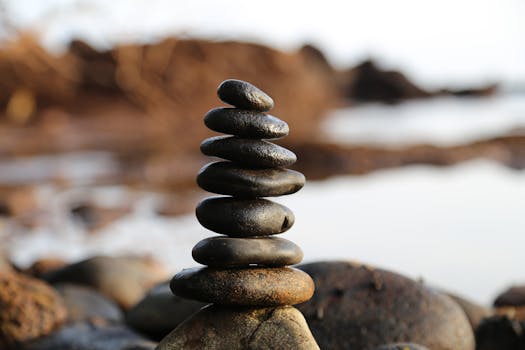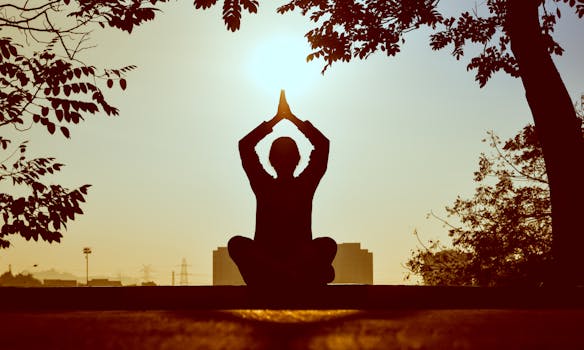
“
Mindfulness Practices for Stress Relief
Mindfulness practices for stress relief are becoming increasingly popular, and for good reason. Mindfulness is the practice of being present in the moment, paying attention to your thoughts, feelings, and sensations without judgment. This powerful technique can help reduce stress and anxiety, improve mood, and enhance overall well-being. To explore more on improving your well-being, check out our article on Timeless Pure Beauty.
What is Mindfulness?

Mindfulness is a state of awareness that involves paying attention to the present moment, without judgment or distraction. It involves cultivating a non-judgmental awareness of one’s thoughts, feelings, and bodily sensations. Mindfulness is often practiced through meditation, deep breathing, and yoga, but it can also be incorporated into daily activities such as eating, walking, or showering. For more insights on meditation, consider reading about Unlocking the Magic of Celestial Delicate Shimmer.
Benefits of Mindfulness for Stress Relief

The benefits of mindfulness for stress relief are numerous. Some of the most significant advantages include:
- Reduced stress and anxiety: Mindfulness has been shown to decrease the production of stress hormones like cortisol, leading to a decrease in anxiety and stress levels.
- Improved mood: Mindfulness can increase the production of neurotransmitters like serotonin and dopamine, which can help improve mood and reduce symptoms of depression.
- Enhanced focus and concentration: Mindfulness can improve attention and focus, leading to greater productivity and efficiency.
- Better sleep: Mindfulness can help regulate sleep patterns, leading to improved sleep quality and duration.
- Increased self-awareness: Mindfulness can increase self-awareness, allowing individuals to better understand their thoughts, feelings, and behaviors.
Mindfulness Practices for Stress Relief

There are many mindfulness practices that can help with stress relief. Some of the most effective techniques include:
- Meditation: Sitting or lying down in a quiet space, focusing on the breath, and letting go of distractions.
- Deep breathing: Focusing on the breath, feeling the sensation of the air moving in and out of the body, and letting go of tension.
- Yoga: Combining physical postures, breathing techniques, and meditation to cultivate mindfulness and reduce stress.
- Body scan: Lying down or sitting comfortably, bringing awareness to different parts of the body, and releasing tension and relaxation.
- Walking meditation: Paying attention to the sensation of the feet touching the ground, the movement of the legs, and the rhythm of the breath.
Getting Started with Mindfulness

Getting started with mindfulness is easy. Here are some tips:
- Start small: Begin with short periods of mindfulness practice, such as 5-10 minutes a day, and gradually increase as you become more comfortable with the practice.
- Find a quiet space: Identify a quiet, comfortable space where you can practice mindfulness without distractions.
- Focus on the breath: Bring your attention to the breath, feeling the sensation of the air moving in and out of the body, and let go of distractions.
- Be gentle with yourself: Remember that mindfulness is a practice, and it’s okay if your mind wanders. Gently bring your attention back to the breath or the present moment.
Mindfulness and Meditation Apps

There are many mindfulness and meditation apps available that can help you get started with mindfulness practice. Some popular options include:
- Headspace: A meditation app that offers guided meditations and tracking features to help you stay consistent with your practice.
- Calm: A meditation and relaxation app that offers guided meditations, sleep stories, and relaxing music.
- Insight Timer: A free meditation app that offers a wide range of guided meditations, as well as a timer for tracking your personal practice.
Conclusion

Mindfulness practices for stress relief are a powerful tool for improving overall well-being. By incorporating mindfulness into your daily routine, you can reduce stress and anxiety, improve mood, and enhance focus and concentration. Remember to start small, be gentle with yourself, and find a quiet space to practice. With regular practice, you can experience the many benefits of mindfulness and live a happier, healthier life. For more tips on enhancing your daily routine, explore our post on Enchanting Floral Vibe.
See more:
https://www.mindful.org/
https://www.headspace.com/
https://www.calm.com/






